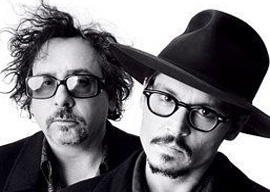
May 16, 2012

Tim Burton and Johnny Depp
It’s an absurd amount to spend on a movie based on a notoriously low-budget television show. This 1966-1971 soap opera started out as a moody Jane Eyre-like tale of a governess in a moldering Maine mansion. Out of ratings desperation, a courtly vampire named Barnabas Collins was tossed into the mix, launching a fad. (During my entire life I”ve been reading clever explications of why vampires are now in style at this moment in our history”usually something involving whoever is president”but I haven”t noticed that vampires are ever long out of fashion.)
Baby boomer proto-Goths raced home from school to see the 1,225 episodes that were ground out on a Stakhanovite schedule. The quality was dire, but the supernatural elements helped justify the pregnant pauses and long, meaningful glances inherent in any soap’s production schedule. Likewise, while all long-running soap operas eventually stumble around to plotlines involving evil twins, being able to blame it on a witch’s curse at least made a little more sense.
Both Burton and Depp enjoyed Dark Shadows in reruns in the 1970s, so with all the money in the world, why not make a tribute to their adolescent infatuation? As demonstrated by their upbeat biopic about the worst director ever, Ed Wood, at heart the pair aren”t satirists, they”re enthusiasts.
The original TV show eventually got gayed-up. But the Burton-Depp persona, while never terribly masculine (Depp has flopped recently playing alpha males John Dillinger and Hunter S. Thompson), is highly heterosexual: not gay, just fey. And Depp is quite funny in his stranger-in-a-strange-land role as the revived vampire.
As in most Burton movies, there’s no particular plot. The ending with the 220-year-old witch (Eva Green) falling apart is lifted bodily from Robert Zemeckis’s Death Becomes Her.
The 53-year-old Burton absolutely nails what 1972 seemed like to an adolescent. A prosperous, cheerful year, 1972 was the last point when the social decay inherent in the 60s was still more of an elite affectation than a mass affliction. I suspect that the moment when the 70s fell apart for good was January 22, 1973, after which many Americans apparently took the Supreme Court’s Roe v. Wade decision as an endorsement from on high to party hearty.
Viewed objectively, Dark Shadows might actually be better than Edward Scissorhands. Burton and Depp ought to have it down pat by now. Yet perhaps Burton used up all his good ideas on his early films. Then again, an artificial boy who has scissors for hands isn”t that great of an idea for anybody over age nine.